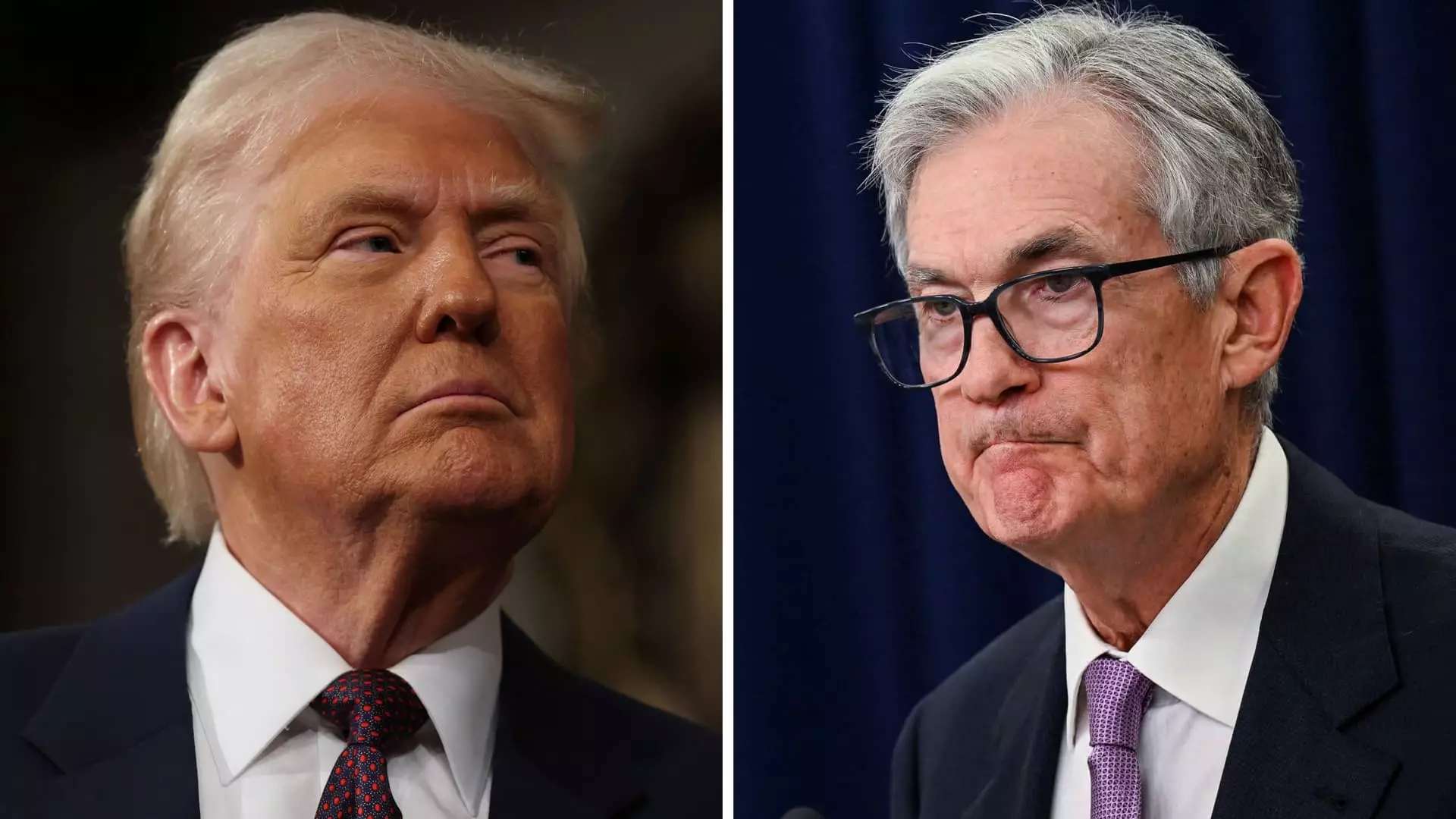In an unsettling display of political volatility, President Donald Trump’s disdain for Federal Reserve Chair Jerome Powell has escalated into a battleground of tweets and aggressive rhetoric. On a Friday that appeared relatively mundane, Trump seized the opportunity to air his grievances against Powell, a move that feels less like a critique and more like an orchestrated attack on the very foundations of U.S. monetary policy. Trump’s statements are not merely a response to economic conditions; they signify deeper concerns regarding autonomy and accountability in federal governance.
Trump’s career has been punctuated by a penchant for blame—an instinctual habit not uncommon in political leadership. By insisting that interest rates should have been lowered by Powell, he not only questions the Fed’s competence but also its independence. The crux of Trump’s obsession lies in the belief that Powell’s cautious approach to monetary policy is holding back an expansive economic vision. To Trump, the world can be reshaped through regulatory manipulation, and the Fed should conform to his desires. This mentality runs counter to the Fed’s mission of maintaining stable prices and full employment, revealing a disturbing desire for control over economic levers.
Threats to Independence and Financial Stability
What is most alarming is the overt suggestion of Powell’s potential ousting as Trump’s patience wears thin. This is not just mere political banter; as White House economic advisor Kevin Hassett hinted, there is a serious deliberation ongoing regarding whether Powell could be removed. Such maneuvers raise significant red flags about the separation of powers and the fundamental doctrines that underpin U.S. fiscal policy. The Federal Reserve’s independence has allowed it to operate free from political pressure, making decisions based on economic data rather than the whims of any sitting president.
Should Trump succeed in toppling Powell, it would establish a precedent that undermines the credibility of one of the world’s most vital economic institutions. Imagine the upheaval that would ensue in financial markets—an upheaval warned by figures like Sen. Elizabeth Warren, who cautioned that signaling to the market that the Fed chair could be dismissed would create instability. This perceived fragility could induce an environment of fear, driving away investors and shaking consumer confidence, which is already delicate. It is a vicious cycle—Trump’s shortsightedness in seeking to reward his immediate political agenda could exact a heavy toll on the economy, echoing over years, if not decades.
The Role of Rhetoric in Political Discourse
As Trump continues his barrage of criticisms, one must wonder how this rhetoric fundamentally shapes the landscape beyond immediate economic implications. Characterizing Powell with derisive titles like “Too Late,” Trump engages in a calculated distortion of the narrative, creating an adversary out of a technocrat simply doing their job. This strategy speaks volumes about the Trump administration’s populist approach; it is a tactic designed to foster a sense of “us versus them,” unhelpfully simplifying complex economic machinations into a digestible, albeit misleading, narrative. Reality becomes whitewashed as political impasses are painted in stark blacks and whites, stripping away the nuances that define effective governance.
Furthermore, Trump’s tactic of weaponizing social media continues to change the game, allowing him to bypass traditional media scrutiny and communicate directly with supporters. Each keystroke sends ripples through financial markets, as investor sentiments fluctuate based on the whims of presidential tweets. This layer of volatility serves only to amplify uncertainty in markets that thrive on predictability, complicating the Fed’s efforts to achieve economic stability.
The Bigger Picture of Economic Policy
While Trump may wish to project an image of strength and decisive action by attacking Powell, the broader implications for economic policy are troubling. A successful economy hinges on a stability that is often at odds with the whims of political leadership. Federal Reserve decisions necessitate a long view, one that doesn’t yield easily to immediate pressures or political calculations. Powell’s measured, data-driven approach is a stark contrast to the mercurial nature of corporate boardrooms where Trump thrives, highlighting a crucial disconnect between populist narratives and the technical complexities of monetary policy.
The danger here is not just the potential ousting of Powell; it is the normalization of a political environment where economic decision-making is influenced by political expedience rather than empirical evidence. Whether the president recognizes it or not, his rhetoric could usher in a new era of chaos—one where the stability of the nation’s financial foundations is compromised amidst political jitters and whims. This kind of maneuvering may cater to short-term agendas but is intrinsically dangerous for the long-term health of both the economy and governance in a democratic society.

Leave a Reply